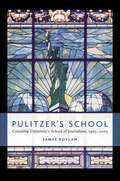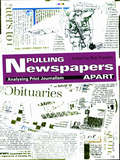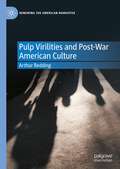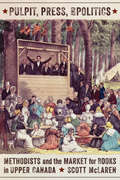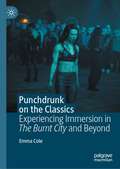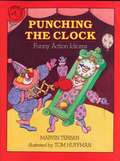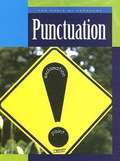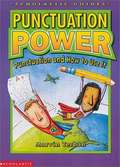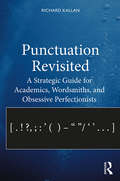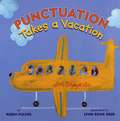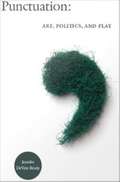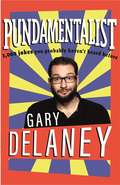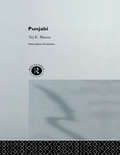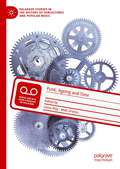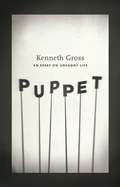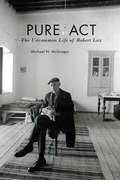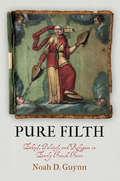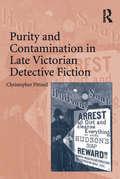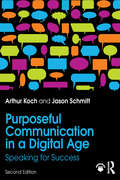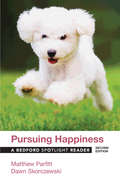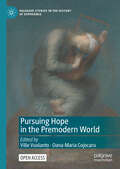- Table View
- List View
Pulitzer's School: Columbia University's School of Journalism, 1903-2003
by James BoylanMarking the centennial of the founding of Columbia University's school of journalism, this candid history of the school's evolution is set against the backdrop of the ongoing debate over whether journalism can—or should—be taught in America's universities.Originally known as "the Pulitzer School" in honor of its chief benefactor, the newspaper magnate Joseph Pulitzer, Columbia's school of journalism has long been a significant and highly visible presence in the journalism community. But at the turn of the twentieth century, when the school was originally conceived, journalism was taught either during an apprenticeship at a newspaper office or as a vocational elective at a few state universities—no Ivy League institution had yet dared to teach a common "trade" such as journalism. It was Pulitzer's vision, and Columbia's decision to embrace and cultivate his novel idea, that would eventually help legitimize and transform the profession. Yet despite its obvious influence and prestige, the school has experienced a turbulent, even contentious history. Critics have assailed the school for being disengaged from the real world of working journalists, for being a holding tank for the mediocre and a citadel of the establishment, while supporters—with equal passion—have hailed it for upholding journalism's gold standard and for nurturing many of the profession's most successful practitioners.The debate over the school's merits and shortcomings has been strong, and at times vehement, even into the twenty-first century. In 2002, the old argument was reopened and the school found itself publicly scrutinized once again. Had it lived up to Pulitzer's original vision of a practical, uncompromising, and multifaceted education for journalists? Was its education still relevant to the needs of contemporary journalists? Yet after all the ideological arguments, and with its future still potentially in doubt, the school has remained a magnet for the ambitious and talented, an institution that provides intensive training in the skills and folkways of journalism. Granted unprecedented access to archival records, James Boylan has written the definitive account of the struggles and enduring legacy of America's premiere school of journalism.
Pulling Newspapers Apart: Analysing Print Journalism
by Bob FranklinPulling Newspapers Apart: Analysing Print Journalism explores contemporary UK national and local newspapers at a significant and pivotal moment in their development when some pundits are busily, if mistakenly, announcing their demise. The book offers a detailed examination of features which previous studies have tended to neglect, such as editorial formats (News, Op Ed pages, readers’ letters, cartoons, obituaries, advice columns, features and opinion columns), aspects of newspaper design (page layout, photographs, supplements, online editions, headlines, the emergence of the compact and Berliner editions), newspaper contents (sport, sex and Page 3, royalty, crime, moral panics and politics) as well as the content of newspapers which is not generated by in house journalists (advertising, TV listings, horoscopes, agency copy and public relations materials). This innovative and accessibly written collection provides journalism and media students with an invaluable study of newspapers in the digital age.
Pulp Virilities and Post-War American Culture (Renewing the American Narrative)
by Arthur ReddingThis book interrogates the repertoire of masculine performance in popular crime fiction and cinema from the 1940s, 50s, and 60s. This critical survey of the back alleys of pulp culture reveals American masculinities to be unsettled, contentious, crisis-ridden, racially fraught, and sexually anxious. Libertarian in their sensibilities, self-aggrandizing in their sentiments, resistant to the lures of upper mobility, scornful of white collar and corporate culture, the protagonists of these popular and populist works viewed themselves as working-class heroes cast adrift. Pulp Virilities explores the enduring traditions of hard-boiled and noir literature, casting a critical eye on its depictions of urban life and representations of gender, crime, labor, and race. Demonstrating how anxieties and possibilities of American masculinity are hammered out in works of popular culture, Pulp Virilities provides a rich cultural genealogy of contemporary American social life.
Pulpit, Press, and Politics: Methodists and the Market for Books in Upper Canada (Studies in Book and Print Culture)
by Scott McLarenWhen American Methodist preachers first arrived to Upper Canada they brought more than a contagious religious faith. They also brought saddlebags stuffed with books published by the New York Methodist Book Concern – North America’s first denominational publisher – to sell along their preaching circuits. Pulpit, Press, and Politics traces the expansion of this remarkable transnational market from its earliest days to the mid-nineteenth century during a period of intense religious struggle in Upper Canada marked by fiery revivals, political betrayals, and bitter church schisms. The Methodist Book Concern occupied a central place in all this conflict as it powerfully shaped and subverted the religious and political identities of Canadian Methodists, bankrolled the bulk of Methodist preaching and missionary activities, enabled and constrained evangelistic efforts among the colony’s Native groups, and clouded Methodist dealings with the British Wesleyans and other religious competitors north of the border. Even more importantly, as Methodists went on to assume a preeminent place in the province’s religious, cultural, and educational life, their ongoing reliance on the Methodist Book Concern played a crucial part in opening the way for what would later become the lasting acceptance and widespread use of American books and periodicals across the province as a whole.
Punchdrunk on the Classics: Experiencing Immersion in The Burnt City and Beyond
by Emma ColePunchdrunk on the Classics: Experiencing Immersion in The Burnt City and Beyond draws attention to Punchdrunk’s use of ancient Greek literature in their creation of immersive theatre. The book documents and analyses the effects of utilising Greek tragedy within both Punchdrunk’s creative development windows, and the company’s final staged productions. It features material stretching from The House of Oedipus (2000) right through to The Burnt City (2022-23), on which the author worked as dramaturg. Chapters include rehearsal studies, explorations of how Greek literature can shape an audience’s experience in immersive theatre, and considerations of how The Burnt City might change our understanding of the poetics of immersion in antiquity. Overall, Punchdrunk on the Classics provides an unparalleled depth of insight into an individual Punchdrunk production, and highlights the until-now overlooked significance of antiquity within Punchdrunk’s practice.
Punching the Clock: Funny Action Idioms
by Marvin TerbanIntroduces and explains action idioms and their origins with comical illustrations that lend a literal interpretation.
Punctuation (The Magic of Language)
by Ann HeinrichsExclamation points, periods, question marks, and commas- all these are common forms of punctuation, and each has the potential to prove confusing to kids learning grammar.
Punctuation Power: Punctuation And How To Use It
by Marvin TerbanPuncuation Power, the newest paperback Scholastic Guide, is a guide to all of the punctuation 8 to 14-year-olds (and most adults) need. It uses a clever format that is fun and informative. Knowing how to puncuate sentences properly is a skill that can help any writer communicate more clearly. PUNCTUATION POWER presents kids with the information they need to become better punctuators. Terban's voice is both energetic and fun. Now available in paperback, this guide can be put in school bags and brought to school, the library, or anywhere else a child would need it.
Punctuation Revisited: A Strategic Guide for Academics, Wordsmiths, and Obsessive Perfectionists
by Richard KallanPunctuation Revisited is an advanced, comprehensive guide to the importance of punctuation in conveying meaning and augmenting the power of a message. Richard Kallan provides guidance on how to structure sentences accurately and in a manner that enhances their readability and rhetorical appeal. This book discusses in fine detail not just when and how to employ specific punctuation marks, but the rationale behind them. It also notes when the major academic style manuals differ in their punctuation advice. These unique features are designed to benefit beginning, intermediate, and advanced students of standard punctuation practice. Punctuation Revisited is a wonderful resource for students of composition and writing, an essential read for writing center tutors and faculty, as well as the perfect addition to anyone’s professional library.
Punctuation Takes a Vacation
by Robin Pulver Lynn Rowe ReedMr. Wright's class can't believe it. What will it be like without question marks, apostrophes, periods, and commas? Punctuation has never been as entertaining as it is in this wacky picture book.
Punctuation Takes a Vacation
by Robin Pulver Lynn Rowe ReedMr. Wright's class can't believe it. What will it be like without question marks, apostrophes, periods, and commas? Punctuation has never been as entertaining as it is in this wacky picture book.
Punctuation: Art, Politics, and Play
by Jennifer Devere BrodyIn Punctuation: Art, Politics, and Play, Jennifer DeVere Brody places punctuation at center stage. She illuminates the performative aspects of dots, ellipses, hyphens, quotation marks, semicolons, colons, and exclamation points by considering them in relation to aesthetics and experimental art. Through her readings of texts and symbols ranging from style guides to digital art, from emoticons to dance pieces, Brody suggests that instead of always clarifying meaning, punctuation can sometimes open up space for interpretation, enabling writers and visual artists to interrogate and reformulate notions of life, death, art, and identity politics. Brody provides a playful, erudite meditation on punctuation's power to direct discourse and, consequently, to shape human subjectivity. Her analysis ranges from a consideration of typography as a mode for representing black subjectivity in Ralph Ellison's Invisible Man to a reflection on hyphenation and identity politics in light of Strunk and White's prediction that the hyphen would disappear from written English. Ultimately, Brody takes punctuation off the "stage of the page" to examine visual and performance artists' experimentation with non-grammatical punctuation. She looks at different ways that punctuation performs as gesture in dances choreographed by Bill T. Jones, in the hybrid sculpture of Richard Artschwager, in the multimedia works of the Japanese artist Yayoi Kusama, and in Miranda July's film Me and You and Everyone We Know. Brody concludes with a reflection on the future of punctuation in the digital era.
Pundamentalist: 1,000 jokes you probably haven't heard before
by Gary Delaney'For a collection of good old-fashioned gags, it's one of the best out there, a rich buffet of inventive wordplay that's best savoured a little at a time to fully appreciate the joy of these perfectly-constructed morsels. For original, hilarious gags you'll want to share, this is the real deal.' - Chortle 'A rollicking joyride. . . Pundamentalist has puns for the whole family: rude ones, daft ones, deft ones, stinkers and absolute belters.' - British Comedy GuideGary Delaney, one-liner extraordinaire, has appeared on shows like Mock the Week and written for the likes of Jimmy Carr, Jason Manford, and James Corden. Now, for the first time, comes the first collection of his finest jokes. Featuring the likes of: Garden centres can't reopen fast enough for me, I've been living on borrowed thyme.We can't even afford a garden, so when my girlfriend bought us a trampoline I hit the roof.Sure everyone cares about straws killing dolphins now, but they've been breaking camels' backs for years.Genius is 1% inspiration and 99% perspiration, which explains why Prince Andrew is so stupid.Sad news: The British simile champion has died. We shall not see his like again.My mom doesn't trust my dad's secretary. I asked her why, and she just said 'I've seen her type before'.Today someone told me that I look good with a salt 'n' pepper beard, so I took that as a condiment.My French pen friend just said 'Le Monde', which means the world to me. Can anyone tell me what FOMO stands for? Everyone else seems to know.Actors have got Equity, Magicians have got the Magic Circle, but it's a shame ventriloquists don't have anyone to speak for them.Does anyone know if it's safe to dye your pubes? It's a bit of a grey area.And make sure you look out for Gary's next book, about Stockholm Syndrome: it starts off badly but by the end you'll really enjoy it . . .
Pundamentalist: 1,000 jokes you probably haven't heard before
by Gary Delaney'For a collection of good old-fashioned gags, it's one of the best out there, a rich buffet of inventive wordplay that's best savoured a little at a time to fully appreciate the joy of these perfectly-constructed morsels. For original, hilarious gags you'll want to share, this is the real deal.' - Chortle 'A rollicking joyride. . . Pundamentalist has puns for the whole family: rude ones, daft ones, deft ones, stinkers and absolute belters.' - British Comedy GuideGary Delaney, one-liner extraordinaire, has appeared on shows like Mock the Week and written for the likes of Jimmy Carr, Jason Manford, and James Corden. Now, for the first time, comes the first collection of his finest jokes. Featuring the likes of: Garden centres can't reopen fast enough for me, I've been living on borrowed thyme.We can't even afford a garden, so when my girlfriend bought us a trampoline I hit the roof.Sure everyone cares about straws killing dolphins now, but they've been breaking camels' backs for years.Genius is 1% inspiration and 99% perspiration, which explains why Prince Andrew is so stupid.Sad news: The British simile champion has died. We shall not see his like again.My mom doesn't trust my dad's secretary. I asked her why, and she just said 'I've seen her type before'.Today someone told me that I look good with a salt 'n' pepper beard, so I took that as a condiment.My French pen friend just said 'Le Monde', which means the world to me. Can anyone tell me what FOMO stands for? Everyone else seems to know.Actors have got Equity, Magicians have got the Magic Circle, but it's a shame ventriloquists don't have anyone to speak for them.Does anyone know if it's safe to dye your pubes? It's a bit of a grey area.And make sure you look out for Gary's next book, about Stockholm Syndrome: it starts off badly but by the end you'll really enjoy it . . .
Punjabi (Descriptive Grammars)
by Tej BhatiaFirst Published in 1993. Punjabi is the language of the Punjab-the land of five rivers--of northern India and Pakistan. Primarily written in three distinct scripts, a unique feature of the language is that, along with Lahanda and the Western Pahari dialects, it is the only modern Indo-European language spoken in South Asia which is tonal in nature. It is recognized as one of the several national languages of India and Pakistan, and approximately forty-five million people speak Punjabi as either a first or second language. This Descriptive Grammar accounts for the linguistic and sociolinguistic properties of Punjabi and Lahanda/Multani. It explores the standard language, giving a comprehensive account of syntax, morphology and phonology. With a descriptive, typological and cognitive examination of the language, this is the most up-to-date, comprehensive and authoritative description of modern Punjabi to date. This volume will be invaluable to students and researchers of linguistic theory and practice.
Punk, Ageing and Time (Palgrave Studies in the History of Subcultures and Popular Music)
by Laura Way Matt GrimesTo date there has been no plotting of punk scholarship which speaks to ‘time’, yet there are some clear bodies of work pertaining to particular issues relevant to it, including ageing and/or the life course and punk, memory and/or nostalgia and punk, ‘punk history’, and archiving and punk. Punk, Ageing and Time is therefore a timely (pun intended) book. What this edited collection does for the first time is bring together contemporary investigations and discussions specifically around punk and ageing and/or time, covering areas such as: punk and ageing; the relationship between temporality and particular concepts relevant to punk (such as authenticity, DIY, identity, resistance, spatiality, style); and punk memory, remembering and/or forgetting. Multidisciplinary in nature, this book considers areas which have received very little to no academic attention previously.
Puppet: An Essay on Uncanny Life
by Kenneth Gross&“Offering endless insights into the strange and archaic world of puppets . . . This is a book of literary mysticism, rich with accrued culture.&” —John Rockwell, The New York Times Book Review The puppet creates delight and fear. It may evoke the innocent play of childhood, or become a tool of ritual magic, able to negotiate with ghosts and gods. Puppets can be creepy things, secretive, inanimate while also full of spirit, alive with gesture and voice. In this eloquent book, Kenneth Gross contemplates the fascination of these unsettling objects—objects that are also actors and images of life. The poetry of the puppet is central here, whether in its blunt grotesquery or symbolic simplicity, and always in its talent for metamorphosis. On a meditative journey to seek the idiosyncratic shapes of puppets on stage, Gross looks at the anarchic Punch and Judy show, the sacred shadow theater of Bali, and experimental theaters in Europe and the United States, where puppets enact everything from Baroque opera and Shakespearean tragedy to Beckettian farce. Throughout, he interweaves accounts of the myriad faces of the puppet in literature—Collodi&’s cruel, wooden Pinocchio, puppetlike characters in Kafka and Dickens, Rilke&’s puppet-angels, the dark puppeteering of Philip Roth&’s Micky Sabbath—as well as in the work of artists Joseph Cornell and Paul Klee. The puppet emerges here as a hungry creature, seducer and destroyer, demon and clown. It is a test of our experience of things, of the human and inhuman. A book about reseeing what we know, or what we think we know, Puppet evokes the startling power of puppets as mirrors of the uncanny in life and art.
Puppy's ABC
by Helen PiersAn ABC book illustrated with photography of a small puppy and objects beginning with each letter.
Pure Act: The Uncommon Life of Robert Lax (Catholic Practice in North America)
by Michael N. McgregorThe only biography to receive awards from both the Association of Catholic Publishers and the Catholic Press Association in 2016. A companion piece to Thomas Merton's bestselling autobiography The Seven Storey Mountain, Pure Act: The Uncommon Life of Robert Lax tells the story of Merton's best friend and early spiritual inspiration. Written by a close friend of Lax, Pure Act gives an intimate view of a friendship and a life that affected Merton in profound ways. It was Lax, a daringly original poet himself, who encouraged Merton to begin writing poetry and Lax who told him he should desire to be a saint rather than just a Catholic. To the end of Merton's life, Lax was his spiritual touchstone and closest friend. Pure Act tells the story of poet Robert Lax, whose quest to live a true life as both an artist and a spiritual seeker inspired Thomas Merton, Jack Kerouac, William Maxwell and a host of other writers, artists and ordinary people. Known in the U.S. primarily as Merton’s best friend and in Europe as a daringly original avant-garde poet, Lax left behind a promising New York writing career to travel with a circus, live among immigrants in post-war Marseilles and settle on a series of remote Greek islands where he learned and recorded the simple wisdom of the local people. Born a Jew, he became a Catholic and found the authentic community he sought in Greek Orthodox fishermen and sponge divers. In his early life, as he alternated working at the New Yorker, writing screenplays in Hollywood and editing a Paris literary journal with studying philosophy, serving the poor in Harlem and living in a sanctuary high in the French Alps, Lax pursued an approach to life he called pure act—a way of living in the moment that was both spontaneous and practiced, God-inspired and self-chosen. By devoting himself to simplicity, poverty and prayer, he expanded his capacity for peace, joy and love while producing distinctive poetry of such stark beauty critics called him “one of America’s greatest experimental poets” and “one of the new ‘saints’ of the avant-garde.” Written by a writer who met Lax in Greece when he was a young seeker himself and visited him regularly over fifteen years, Pure Act is an intimate look at an extraordinary but little-known life. Much more than just a biography, it’s a tale of adventure, an exploration of friendship, an anthology of wisdom, and a testament to the liberating power of living an uncommon life.
Pure Filth: Ethics, Politics, and Religion in Early French Farce (The Middle Ages Series)
by Noah D. GuynnAs Noah D. Guynn observes, early French farce has been summarily dismissed as filth for centuries. Renaissance humanists, classical moralists, and Enlightenment philosophes belittled it as an embarrassing reminder of the vulgarity of medieval popular culture. Modern literary critics and theater historians often view it as comedy's poor relation—trite, smutty pap that served to divert the masses and to inure them to lives of subservience. Yet, as Guynn demonstrates in his reexamination of the genre, the superficial crudeness and predictability of farce belie the complexities of its signifying and performance practices and the dynamic, contested nature of its field of reception. Pure Filth focuses on overlooked and occluded content in farce, arguing that apparently coarse jokes conceal finely drawn, and sometimes quite radical, perspectives on ethics, politics, and religion.Engaging with cultural history, political anthropology, and critical, feminist, and queer theory, Guynn shows that farce does not pander to the rabble in order to cultivate acquiescence or curb dissent. Rather, it uses the tools of comic theater—parody and satire, imitation and exaggeration, cross-dressing and masquerade—to address the urgent issues its spectators faced in their everyday lives: economic inequality and authoritarian rule, social justice and ethical renewal, sacramental devotion and sacerdotal corruption, and heterosocial relations and household politics. Achieving its subtlest effects by employing the lewdest forms of humor, farce reveals that aspirations to purity, whether ethical, political, or religious, are inevitably mired in the very filth they repudiate.
Purity and Contamination in Late Victorian Detective Fiction
by Christopher PittardConcentrating on works by authors such as Fergus Hume, Arthur Conan Doyle, Grant Allen, L.T. Meade, and Marie Belloc Lowndes, Christopher Pittard explores the complex relation between the emergence of detective fictions in the 1880s and 1890s and the concept of purity. The centrality of material and moral purity as a theme of the genre, Pittard argues, both reflected and satirised a contemporary discourse of degeneration in which criminality was equated with dirt and disease and where national boundaries were guarded against the threat of the criminal foreigner. Situating his discussion within the ideologies underpinning George Newnes's Strand Magazine as well as a wide range of nonfiction texts, Pittard demonstrates that the genre was a response to the seductive and impure delights associated with sensation and gothic novels. Further, Pittard suggests that criticism of detective fiction has in turn become obsessed with the idea of purity, thus illustrating how a genre concerned with policing the impure itself became subject to the same fear of contamination. Contributing to the richness of Pittard's project are his discussions of the convergence of medical discourse and detective fiction in the 1890s, including the way social protest movements like the antivivisectionist campaigns and medical explorations of criminality raised questions related to moral purity.
Purposeful Communication in a Digital Age: Speaking for Success
by Arthur Koch Jason SchmittIn recent years, the process and outlet for public speaking has grown with digital progressions such as TED talks and Facebook Live. Purposeful Communication in a Digital Age, 2nd Edition, provides a practical, step-by-step approach to developing and delivering effective speeches. Offering supplementary articles, case studies, and interviews with key leaders within the text and online, this is an all-in-one resource for the traditional, online, or hybrid classroom. The new edition devotes focus to presenting in the digital world, addressing both traditional and contemporary forms of presentation, and specifically directs students on seeking out credible sources when conducting research. Its eResource features video speech examples, classroom exercises, an instructor manual, and a quiz bank.
Purrieties of Language: How We Talk about Cats Online
by Edith PodhovnikAfter conquering the Internet, cats are now taking on linguistics! Since the advent of social media, cats have become a topic central to online communication, and the multitude of cat-related accounts now online has made this a world-wide phenomenon. Through cat-inspired varieties of language, we have developed a genre of cat-inspired vocabulary. And on our special social media accounts for our cats, we take on their identities, as we post, write, talk, and chat - as our feline friends. This innovative book provides linguistic analyses of the cyber 'Cativerse', exploring online language variation, and explaining key linguistic concepts – all through the lens of cat-related communication. Each chapter explores a different sociolinguistic phenomena, drawing on fun and engaging examples including memes, hashtags, captions and 'LOLcats', from platforms such as Instagram, Facebook, YouTube and Twitter. Innovative yet accessible, it is catnip for all 'hoomans' interested in how language is used online.
Pursuing Happiness: A Bedford Spotlight Reader
by Matthew Parfitt Dawn SkorczewskiPursuing Happiness: A Bedford Spotlight Reader explores questions around the central concept of what makes us happy: What is the psychology of happiness? Can we make or buy our own happiness? How should we question what makes us happy? How can we make ourselves and others happy? Does technology make us happy? Readings by philosophers, psychologists, spiritual leaders, ethicists, economists, and others take up these issues and more. Questions and assignments for each selection provides a range of activities for students. The catalog page for the titles in the Spotlight Series offers comprehensive instructor support with sample syllabi and additional teaching resources.
Pursuing Hope in the Premodern World (Palgrave Studies in the History of Experience)
by Ville Vuolanto Oana-Maria CojocaruThis open access book provides the first scholarly account of the role of hope and hopefulness from the perspective of social and cultural life in ancient, medieval and early modern societies. This edited collection brings together fourteen chapters based on case-studies from its contributors, along with a theoretical chapter that serves as the introduction. Throughout history, people have gone on with their lives despite many kinds of trials and tribulations. In this, hope, understood as a future-oriented positive disposition, has been a major driving force to manage uncertainty, mitigate despair, and to give meaning to living. This book analyzes these life situations and changing responses to them in the context of hope and futurity in a longue durée perspective.
